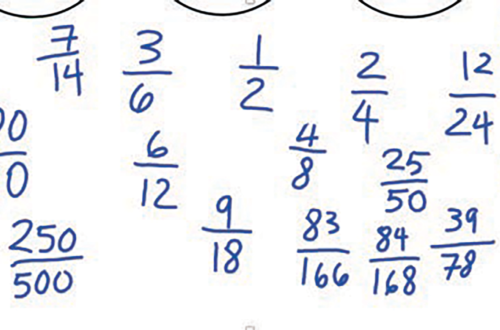Journal of the Mathematics Council of the Alberta Teachers’ Association
Volume 52 Issue 1, December 2014
This issue of delta-K showcases writing by teacher educators, mathematicians, and graduate and undergraduate education students. This collection of articles is a reminder of the rich heritage of researching and teaching mathematics that we share in Alberta. Despite challenges related to grading policies and back-to-the-basics movements that have been highlighted in the media recently, teachers are engaged in creating learning opportunities for their students that embrace fluency and conceptual development of mathematics.
Ronald Persky provides a glimpse into retention and grading policies at the postsecondary level. These mirror much of the Alberta scene, especially in light of the grading controversy in Edmonton.1 As we enact the ministerial order on student learning, which requires teachers to attend to the development of engaged thinkers, ethical citizens and an entrepreneurial spirit, I think our understanding of assessment will continue to deepen.
Lisa Sauder and Marina Spreen each present current research on topics emerging from their teaching practice. Their work as graduate students demonstrates the strong presence of teacher researchers in our schools.
Nico Higgs and Egan Chernoff interrogate the importance of pedagogical content knowledge for math teachers, from a Saskatchewan perspective. Their review of the literature and programs has similar implications for teaching mathematics in Alberta. In light of the explicit inclusion of basic facts in the K-6 mathematics program of studies, these authors remind us that a robust mathematical background in professional knowledge is necessary.
Jessica Shaw and Maxine Elter offer an idea for integrating Aboriginal perspectives into math. The idea emerged from their practice and from Maxine ·s experiences in an undergraduate teacher education program.
Finally, l review Mathematical Models.for Teaching: Reasoning Without Memorization, by Ann Kajander and Tom Boland. This book presents teaching ideas that are timely for teacher educators, teachers and education students as we navigate the changing landscapes of assessment, fluency and conceptual understandings, as well as the professional learning of math teachers.
l am encouraged by the professional learning demonstrated in these articles, and I appreciate the consistent focus on teaching and learning mathematics.lam proud to be a teacher in Alberta during this time of transition, and I look forward to hearing from you as you share your readers’ responses. book reviews, student work. and research and teaching articles.
Gladys Sterenberg
Notes
- For a reminder of what was in the news in early September, sec https://www.cbc.ca/news/canada/edmonton/lynden-dorval-fired-for-giving-zeros-treated-unfairly-appeal-board-rules-1.2751007 (accessed Novcmher 24. 2014).
- The ministerial order on student learning can be found at http://education.alberta.ca/department/policy/standards/goals.aspx (accessed November 24. 2014).
1
2
Gladys Sterenberg
3
Ronald Persky
4
Seven Pointers for Teaching Mathematics
Marlow Ediger
5 – 10
Mathematical Discourse in the French Immersion Classroom
Lisa Sauder
11 – 16
Gender and Mathematics: How to Control an Uncontrollable Variable
Marina Spreen
17 -21
Nico Higgs and Egan J Chernoff
22 – 23
Aboriginal Hand Games and Probability
Jessica Shaw and Maxine Elter
24 – 25
Success by Numbers Math Competitions Help Prepare Students for Challenges Ahead
Johan Rudnick
26 -39
Alberta Mathematics Competitions 2013/14
40
Reviewed by Gladys Sterenberg
41 – 44



